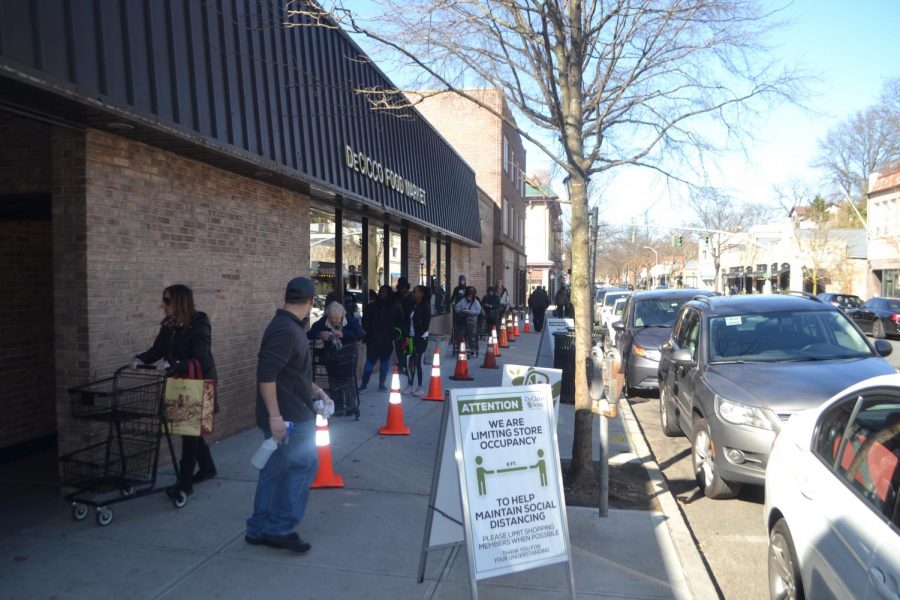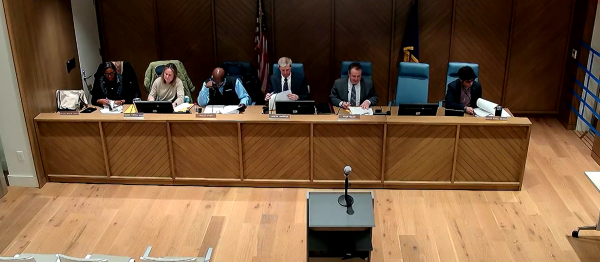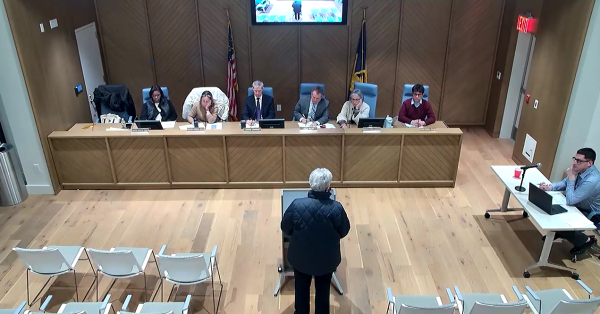Pelham restaurants stagger, grocery stores thrive as Covid-19 restrictions take hold

Customers, socially distanced, wait in line outside DeCicco and Sons.
On a Friday evening, DeCicco and Sons was bustling. A line to enter the store stretched alongside the supermarket’s bright windows.
Elsewhere on Fifth Avenue, storefronts sat quiet. Some restaurants were dark, others had their lights on. For those that remain open, employees sit taskless among empty tables.
“I could easily be closed by the end of the month,” said Clay Bushong, owner of Cantina Lobos and president of the Pelham Chamber of Commerce.
Amidst new limitations on business in New York State because of Covid-19, Pelham’s restaurants are struggling to adapt. While only allowed to operate through takeout and delivery services, some have cut employment. All anticipate staggering losses.
Meanwhile, grocery stores have experienced a surge in demand, leading to lapses in supply and new safety precautions.
With his New York State on PAUSE executive order taking effect last Sunday evening, Gov. Andrew Cuomo mandated the closure of all “non-essential” businesses in New York State, with the exception that restaurants can remain open for takeout and delivery. Grocery stores are considered “essential,” and therefore remain open.
Bushong said Cantina Lobos is not oriented towards takeout and delivery. “It has always been about customer interaction and customer service,” he said. Bushong added that replacing in-person service with takeout and delivery is “like trying to put a band-aid on an artery.”
The restaurant typically uses third-party delivery companies like Grubhub and UberEats, but Bushong stopped using these services in recent weeks. He said they can take as much as 30% of the revenue from each purchase, and he is concerned about strangers handling orders during the outbreak.
Bushong has transitioned to deliveries by his own employees. At the same time, he has transitioned to “skeleton staff” by letting go ten workers, some of whom have worked at the restaurant since it opened in 2016. Bushong said he will rehire his entire staff when he is able, but he does not know when that will be.
Similarly, Rockwells has transitioned from third-party delivery services to free delivery by staff, according to manager Stephen Robins. Robins also limited hours for 75% of his employees, including service and kitchen staff.
Takeout and delivery typically accounts for 10% of Rockwells’ business, said Robins. The restaurant also is doing less takeout and delivery business than it used to, although he expects to see improvement in the coming weeks.
“We’re going to have to do more (takeout and delivery business) than we used to,” Robins said. He hopes that the restaurant’s losses will not be too significant, but noted that “we just don’t know how long this is going to go on.”
As of March 16, the New York State Liquor Authority relaxed rules for licensees, allowing restaurants to sell alcohol in takeout and delivery orders. Both Cantina Lobos and Rockwells plan to take advantage of this. Typically, alcohol sales account for nearly half of Cantina Lobos’ revenue and 20% of Rockwells’, according to Bushong and Robins, respectively.
Even restaurants that were typically more oriented towards takeout and delivery are struggling. According to manager Georgie Chin, 60% of Pelham Palace’s business is delivered or picked up, but sales have been slow in recent days.
“I guess people must have a lot of food at home with everybody clearing the shelves at the supermarket,” Chin said. As a result of business slowing, Chin let go three employees and has had to restrict hours for those who remain.
But she said the restaurant will not close. “We are going to be strong and pray,” Chin said. “We still have our loyal customers. That’s why we are staying open.”
High-end restaurants in Pelham may fare even worse. Caffe Regatta does not have a regular takeout business and does not deliver, according to the owner and chef Anthony Labriola. He said transitioning to a regular takeout service would be a major adjustment.
“I can’t anticipate that many people will take food to-go,” Labriola said. Although he said he has received many calls from concerned customers, Labriola does not think a takeout business will be able to compensate for the lack of in-person service at the restaurant.
So far, Labriola has not cut employment, but has cut hours for his staff. He said that if the restaurant’s revenue can cover the payroll, he is willing to remain open.
While restaurants are struggling, grocery stores are thriving.
According to store manager Chris Dapolito, DeCicco and Sons in Pelham has experienced as much as a 40% increase in sales on a daily basis. Sales have increased significantly in spite of measures to limit the number of customers in the store at any given moment.
DeCicco is regularly at less than 50% capacity, according to Luisa De Cicco, director of human resources . Other health and safety measures include disposable gloves for all customers, plexiglass barriers between checkouts and spacing out customers in line for checkouts. DeCicco and Sons has also established a dedicated hour of shopping every day for elderly and immunosuppressed people.
Dapolito said the store has had some lapses in supply for items like toilet paper and hand sanitizer. Distributors have limited the number of items that can be shipped, so the store has received shipments from different suppliers for other items.
“As much as we’re getting some shortages, the shelves are actually pretty full,” Dapolito said.
Manor Market has also seen an increase in sales because of the coronavirus. Manager Luis Olavarria said that the store has been limited in the size of orders from suppliers. He thinks the bump in sales will not last.
“Later down the line, people have so much stuff that there is going to be a drop coming,” Olavarria said.
In order to calm the nerves of business owners, State Sen. Alessandra Biaggi held a digital town hall on Monday night with about 40 members of the Pelham Chamber of Commerce during which she reiterated several actions taken by the state government to help small businesses, including the availability of low-interest business loans, a 90-day freeze on mortgage payments and a moratorium on evictions.
Bushong said he is currently looking into options to help his business, but he said the restaurant will need community help to get by.
Ben Glickman is a freshman at Brown University. He started his journalism career writing for the school newspaper, the Pel Mel, as a columnist and editorial...












Anne Frascarelli • Mar 25, 2020 at 2:55 pm
Is there a way I can make a donation to a restaurant to produce meals for either those in need or for first responders? I don’t need to order for myself but would like to help my neighborhood restaurants.